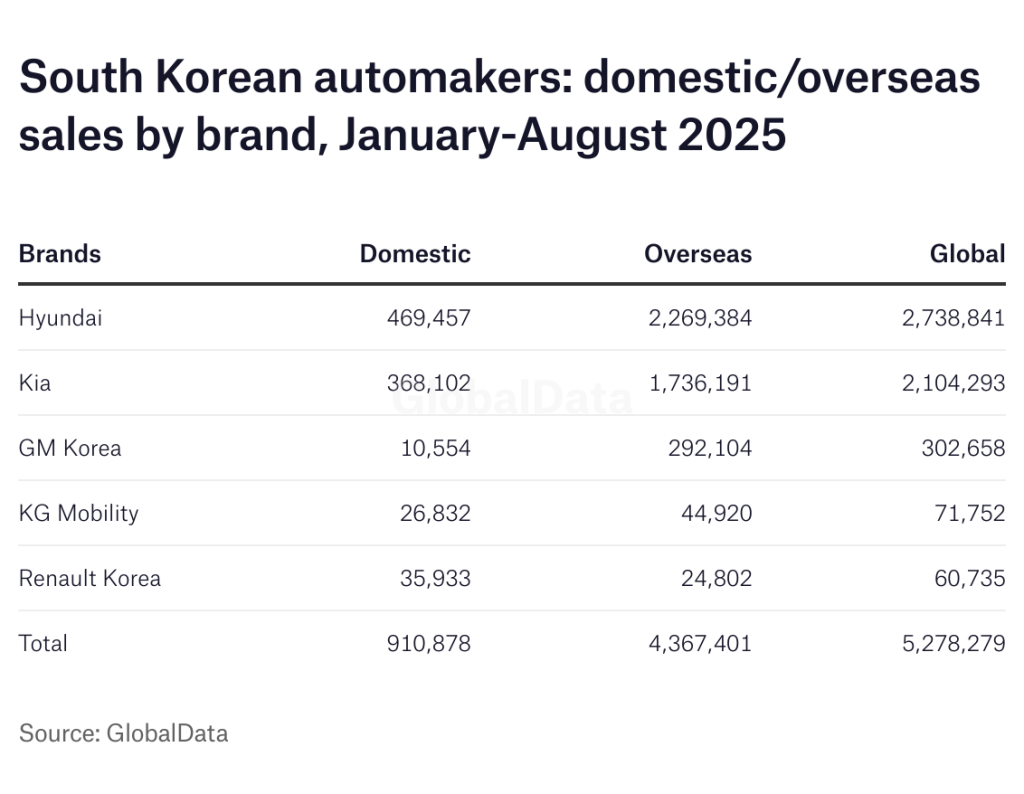
Domestic sales by South Korea’s five main automakers combined increased by 5% to 111,523 units in August 2025 from 106,149 units a year earlier, according to preliminary wholesale data released individually by the manufacturers. The data do not include sales by South Korea’s low-volume commercial vehicle manufacturers, including Tata-Daewoo and Edison Motors, while import brands are covered in a separate report later in the month.

Discover B2B Marketing That Performs
Combine business intelligence and editorial excellence to reach engaged professionals across 36 leading media platforms.
The domestic vehicle market last month continued to be supported by the recent roll-out of new products, particularly by the country’s largest automakers, Hyundai and Kia. Overall vehicle demand in the country remains sluggish, however, due to high household debt and weak sentiment. The country’s GDP expanded by 0.6% in the second quarter, according to preliminary government data, after shrinking by 0.2% in the first quarter, helped by a further 25 basis point interest rate cut to 2.50% in May – the fourth cut in the last year from a peak of 3.50%.
In the first eight months of the year, the country’s five main domestic vehicle manufacturers reported a 2.5% increase in domestic sales to 910,878 units, up from 888,320 units in the same period last year. Hyundai reported a 2.1% rise to 469,457 units, while Kia’s sales increased slightly to 368,102 units. GM Korea was the worst performer, with sales plunging by 39% to 10,554 units, while KG Mobility reported a 17% drop to 26,832 units. Renault Korea was the best-performing brand, with domestic sales surging by 156% to 35,933 units, following the recent launch of the Geely-based Grand Koleos Hybrid and the Scenic E-Tech.
Global sales by the country’s “big-five” automakers, including vehicles produced overseas, increased by less than 1% to 5,278,279 units in the first eight months of 2025 from 5,238,115 units a year earlier – with overseas sales also up slightly to 4,367,401 units from 4,349,795 units.

Hyundai Motor’s global sales rose by just 0.4% to 336,395 vehicles in August 2025 from 334,905 a year earlier, with domestic and overseas sales both slightly higher. In the first eight months of the year, the company sold a total of 2,738,841 vehicles globally, slightly higher than the 2,732,043 units sold a year earlier.
Domestic sales rose by 0.4% to 58,330 units last month from 58,087 a year earlier, resulting in a 2.1% increase to 469,457 units in the first eight months of the year from 459,800 previously. Overseas sales increased by 0.5% to 336,395 units in August from 334,905 units a year earlier, while year-to-date volumes were down slightly to 2,269,384 from 2,272,243 units, despite strong growth in North America.
The company’s new EV plant in the US state of Georgia became operational last October, producing the Ioniq 5, followed by the Ioniq 9 earlier this year. A Kia model is also set to go into production in 2026. The automaker said it will expand capacity at the plant to 500,000 units per year later in the decade, from 300,000 at present.
Earlier this year, Hyundai set a target of 4,174,000 global vehicle sales for 2025, including its Genesis luxury brand, representing a slight increase over 2024 volumes. This includes 710,000 domestic sales and 3,464,000 overseas sales. The automaker last month said it will increase its planned investment in the US by 24% to US$ 26 billion to help it increase local production and content, in support of South Korea’s recent import tariff negotiations with the US government.
Kia’s global sales increased just slightly to 253,950 vehicles in August from 251,920 a year earlier, supported by recently-launched battery electric vehicles (BEVs) and hybrid models, and strong demand for core SUV models such as the Sportage and Seltos, with 44,969 and 27,805 deliveries, respectively. In the first eight months of the year, Kia’s global sales rose by 1.7% to 2,104,293 units from 2,069,415 a year earlier.
Domestic sales rose by 7.4% to 43,501 units last month from 40,510 units a year earlier, with the Sorento its best-selling model 6,531 domestic deliveries, followed by the Carnival with 6,031 units and the Sportage with 5,755 units. Domestic sales in the first eight months of the year increased slightly to 364,941 units from 361,760 a year earlier. The company sold a further 3,161 special purpose vehicles (SPVs) in this period, down from 3,300 a year earlier, most of which were military vehicles delivered domestically.
Overseas sales fell slightly to 209,887 units in August, from 210,765 a year earlier, but were up by almost 2% to 1,736,191 units year-to-date from 1,704,355 units. The Sportage was the brand’s best-selling model overseas last month with 39,214 deliveries, followed by the Seltos with 23,567 units. In August, the company began production of its EV4 hatchback at its manufacturing hub in Slovakia, its first BEV to be produced in Europe.
Kia is targeting a 4% increase in global sales to 3,216,200 units in 2025, including 550,000 domestic sales, 2,658,000 overseas sales, and 8,200 SPV sales, supported by the recent launch of the new K4 and revamped K5 sedans and the Syros SUV in India. In the first quarter of the year, the company rolled out its new Tasman pickup truck and the EV4 battery-powered sedan, with the PV5 and EV5 models set to follow later in the year. The company’s medium-term plan is to sell 4.3 million vehicles globally by 2030, including 1.6 million BEVs.
GM Korea’sglobal sales rose by 35% to 21,059 units in August from 15,634 units a year earlier, reflecting sharply higher overseas sales, while deliveries in the first eight months of the year were 2% lower at 302,658 from 307,620 units. The locally-produced Trailblazer SUV and Trax crossover vehicle remain by far the company’s best-selling models, with most output shipped overseas.
Domestic sales continued to plunge last month, falling by 25% to 1,207 units from 1,614 units a year earlier, with year-to-date sales dropping by 39 % to 10,554 units from 17,270 units, as the automaker struggled with rising competition from other domestic manufacturers and from importers.
Exports surged by almost 42% to 19,852 units in August from 14,020 a year earlier, but were just slightly higher year-to-date at 292,104 units from 290,397 units. Around 85% of output was shipped to the US last year, making the company particularly vulnerable to US import tariff hikes.
KG Mobility (KGM) reported a 9% increase in global sales to 8,860 vehicles in August from 8,128 units a year earlier, reflecting stronger domestic sales and exports. Total sales in the first eight months of the year were 2% lower at 71,752 units, compared with 73,006 a year earlier. The company, previously known as Ssangyong Motor, was acquired in late 2022 by a consortium led by local steel and chemicals firm KG Group.
Domestic sales rose by 3% to 4,055 units last month from 3,943 a year earlier, helped by the recent launch of the Actyon Hybrid, but were down by 17% to 26,832 units year-to-date from 32,158 units, as the automaker struggled to keep up with rising competition from other domestic manufacturers and from importers.
Overseas sales increased by 15% to 4,805 units in August from 4,185 a year earlier, resulting in a 9% rise to 44,920 units year-to-date from 40,848 units a year earlier, as the company continued to expand its global market coverage.
KGM plans to further expand its zero-emissions vehicle range, following the launch of a new minivan version of the Torres EVX battery-powered SUV last September and the new battery-powered Musso EV pickup truck earlier this year. The company has entered into a strategic partnership with China’s Chery Automobile Company, involving vehicle and platform sharing aimed at helping it strengthen its SUV line-up. The deal will also give KGM access to readily available new energy vehicle (NEV) technologies. The automaker recently said it aims to introduce at least eight new models by 2030.
Renault Korea‘s global sales fell by 24% to 6,437 units in August from 8,451 units a year earlier, reflecting a sharp drop in overseas sales. In the first eight months of the year, global sales rose by just over 8% to 60,735 units from 56,031 previously.
Domestic sales surged threefold to 3,868 units last month from 1,350 units a year earlier, resulting in year-to-date volumes rising by 156% to 35,933 from 14,032 units – following the recent launch of the new Geely-based Grand Koleos Hybrid SUV and the Scenic E-Tech BEV. Exports plunged by 63% to 2,589 units in August from 7,101 a year earlier and were down by 41% to 24,802 units in the first eight months of the year from 41,999 units.
The company recently restructured its assembly plant in Busan, resulting in more production being allocated for the local market. A model based on the battery-powered Geely Polestar 4 is scheduled to go into production later this year.






